Lack of Information and Misaligned Distribution of People’s Credit
The disbursement of People’s Business Credit faces numerous challenges. Farmers and small business owners are vulnerable to loan sharks and middlemen.
maaf email atau password anda salah
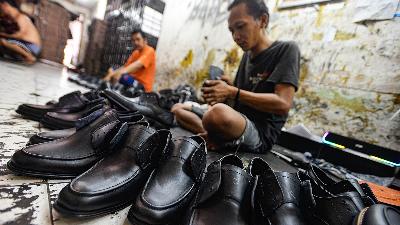
The disbursement of People’s Business Credit faces numerous challenges. Farmers and small business owners are vulnerable to loan sharks and middlemen.

Over a dozen Lambung Mangkurat University lecturers are suspected of manipulating the requirements to apply for a professorship. They could be stripped of their titles.
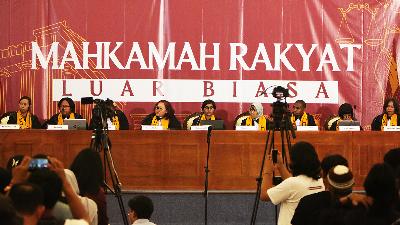
Summary of events of the week, from the People’s Tribunal trying Jokowi to the nine years sentence for former Pertamina CEO Karen Agustiawan.

Animal abuse is on the rise. Light punishments fail to produce a deterrent effect on perpetrators.
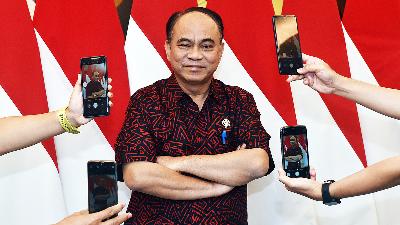
Budi Arie Setiadi, Minister of Communication and Chairman of Projo’s Central Executive Board, speaks of Jokowi’s choice for the presidential candidate and the priorities of his ministry.

The Attorney General’s Office responds to the report on the restorative justice for sexual abuse victims.

Prabowo Subianto will almost certainly choose Gibran Rakabuming Raka as his vice-presidential running mate. Jokowi supports a Prabowo-Gibran ticket.

Foreign exchange surplus is receding. But there is a hope that a huge fund will get back to the country during the elections campaign.

The DPR and the government will shortly pass the omnibus Health Bill. They want to repeat the process used for the passing of the Job Creation Law.
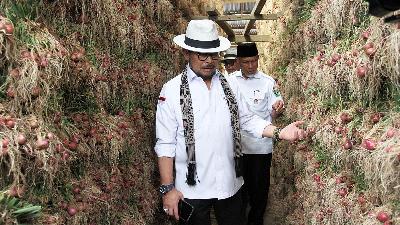
Through people close to him, Agriculture Minister Syahrul Yasin Limpo allegedly received tributes to fund his personal needs.

There are indications that sophisticated Israeli bugging equipment has been used in Indonesia since 2018. This is a result of weak regulations.
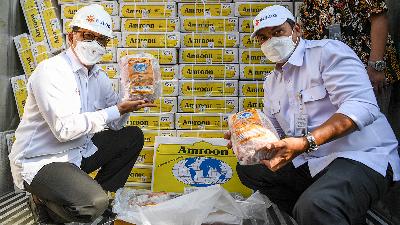
Bulog is suspected of handing over imported buffalo meat distribution to Suri Nusantara Jaya. The agriculture ministry took action to block the monopoly.
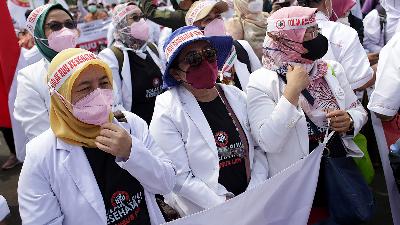
The omnibus health bill allegedly was entrusted to the DPR by the government. It would give health ministry great authority.
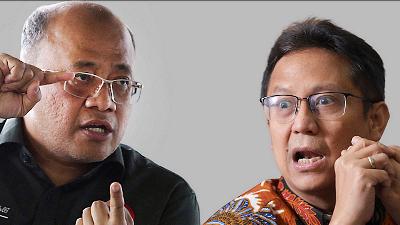
Rationalization of the healthcare omnibus bill by Health Minister Budi Gunadi and Indonesian Medical Association (IDI) Chair Adib Khumaidi
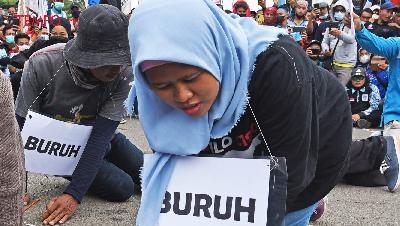
The government issued a job creation omnibus regulation in lieu of law (perpu) ignoring a Constitutional Court ruling. This is proof of the increasing signs of autocratic legalism.
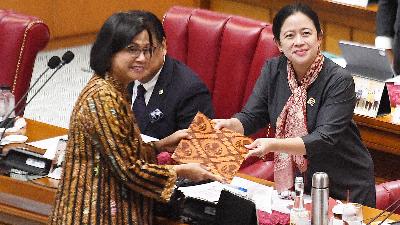
The PPSK Law was passed with relatively fast deliberations. This financial omnibus law unifies 17 laws, changing the gameplay of many financial services institutions and businesses.
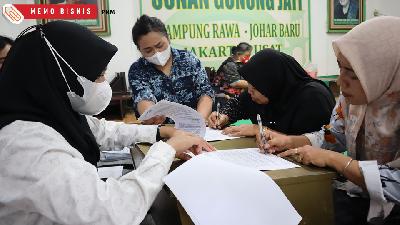
The total funds disbursed to the five selected partners reached IDR 350 million. #Infotempo
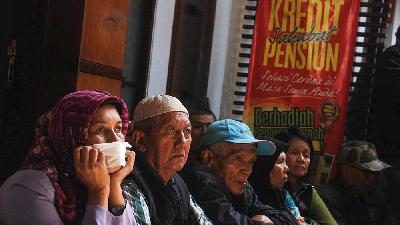
Indonesia is on the list of countries with risky pension systems. There is a sufficient gap between the contributions paid and pension income received by retired civil servants. The government will soon issue regulations on reforming pension schemes.
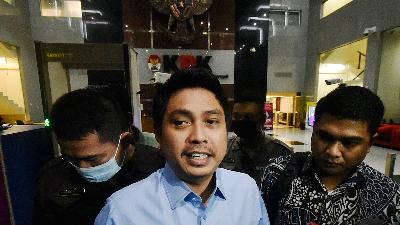
The KPK named Mardani H. Maming, a former Regent of Tanah Bumbu, a suspect in a bribery case involving the reassigning of a coal mining permit. He accused it was orchestrated by Haji Isam.

The government has postponed the increase in the ticket price to Rp750,000 for access to the Borobudur Temple. This was problematic from the planning stage.

Letters from readers: from sexual abuses at IAIN Ambon to the concept of the sharing economy.

How do we assess oil and gas projects that contribute to the realization of “Resilient Indonesia, Growing Indonesia”?
How do they contribute to the rise of Indonesia's economic growth? What about their contributions to the transfer of knowledge for Indonesia? Or, their contribution to the development of the communities around their area of operations? Keep reading, we will get the answers to these three questions.
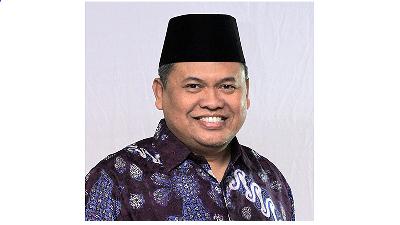
The National Zakat Agency (Baznas) encourages digital transformation as a strategy to strengthen the performance of alms management. However, Baznas CEO Mohamad Arifin Purwakananta views that the digitalization that has been seriously developed since 2016 has not really been evenly distributed.

Seasoned musician Candra Darusman was again at the center of efforts to fight for the welfare of musicians and songwriters. As the chair of Indonesian Musician Union Federation (Fesmi), his input was solicited for the formulation of Government Regulation No. 56/2021 regarding the management of music royalties. The regulation inked by President Joko Widodo on March 30 not only governs parties responsible to pay royalties but also lays down the basis for the establishment of a data center as well as a music information system. Before he headed Fesmi in 2019, Candra represented Indonesia at World Intellectual Property Organization for 18 years, nine years respectively at the organization’s offices in Switzerland and Singapore. After decades of being active in intellectual property rights protection, Candra is determined to improve the lives of musicians and songwriters by, among others, improving royalty management amid new challenges in the digital era.
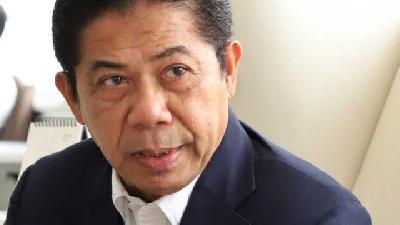
Retired Police Commissioner General Gories Mere explained the extent of his involvement on a case of land corruption in Torro Lemma Batu Kallo, Labuan Bajo, East Nusa Tenggara, which is suspected of resulting in Rp3 trillion in state losses. He said that he cancelled the entire transaction in early 2018.
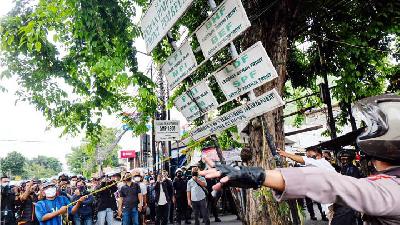
The plan to ban the Islam Defenders Front (FPI) emerged after Rizieq Shihab’s return from Saudi Arabia. President Joko Widodo is said to be the one who wanted the organization disbanded. Jokowi received input from businesses to improve the investment climate. FPI’s political power is considered as weakening.
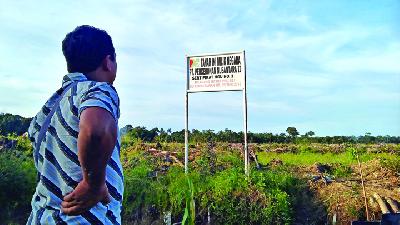
Land of the Rakyat Penunggu customary community in the Langkat Regency of North Sumatra was taken over for the sugar self-sufficiency project carried out by Perkebunan Nusantara II. Residents were intimidated and promised lands and employment in order to go along with the plan.

Rizieq Shihab’s return to Indonesia caused a panic within the government. President Joko Widodo is reportedly furious that crowds were allowed to gather at events involving the Islam Defenders Front leader. He reprimanded his subordinates for providing inaccurate data and failing to prevent masses from gathering. The Indonesian Military responded by putting troops on alert and taking down attributes promoting Rizieq.

The Job Creation Law cancels the formation of a special state company for executing upstream oil and gas business activities. It has to wait for the revision of the Oil and Gas Law.
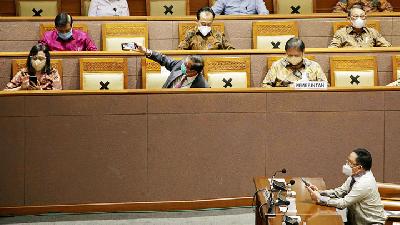
Business-friendly articles were included in the last moments of the Job Creation Bill’s deliberation process, with Golkar Party motoring these changes. The law is believed to be legally defective because the bill’s final draft was not yet ready when the it was passed.

MANY artists and other public figures are uploading the hashtag #IndonesiaButuhKerja (Indonesia needs employment) in their social media accounts.
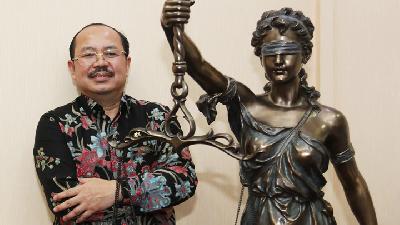
Amzulian Rifai, Chairman of Indonesian Ombudsman:

I have followed the coverage of Tempo about the case of sexual abuse occurring at Herkulanus Parish in Depok, West Java. I feel grateful and salute the courage of Tempo to publish this fairly sensitive article.
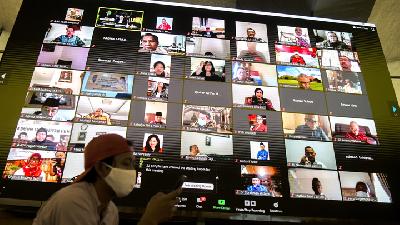
Deliberations on the Omnibus Bill is continuing in the midst of a recess period and at the height of the Covid-19 pandemic. Golkar Party is giving its full support.
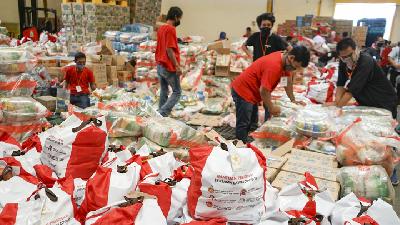
The central and regional governments have begun distributing social aid for those impacted by the Covid-19 pandemic. But the disordered database of recipients has resulted in improper aid distribution. Losses may be suffered by the state.
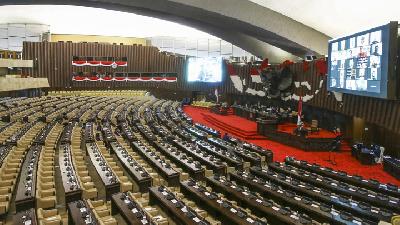
The omnibus bill on job creation will be discussed in the Legislation Body. It could share the same fate as in the revision to the KPK Law.
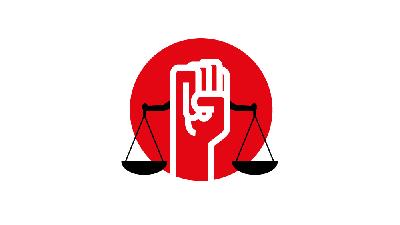
Preventing public participation in the drawing up of the omnibus law is anti-democratic. There is no reason to continue with this unrealistic project.
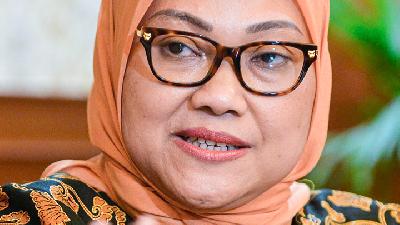
The omnibus bill on job creation will be the first challenge for Manpower Minister Ida Fauziyah.
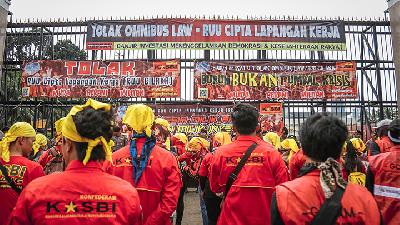
Numerous dissemination efforts seem unable to prevent demonstrations planned by labor unions to protest the omnibus bill. New problems appear to arise outside of the official draft content.
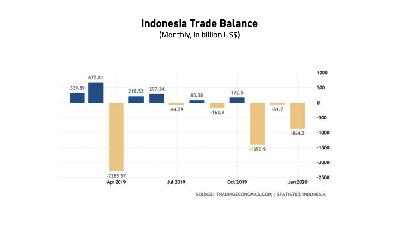
Yopie Hidayat (Contributor)
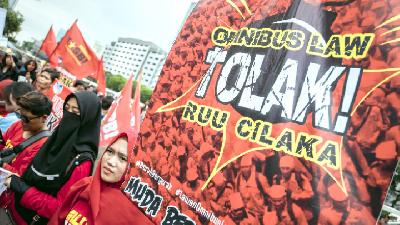
The government plans to turn in a draft of the Omnibus Law to the House of Representatives (DPR) this month.

The deliberations of omnibus laws that are taking place behind closed doors are causing suspicion. The government and the DPR must involve the public.

THE presence of the Tourism Authority Board of Labuan Bajo Flores (BOP-LBF) within the framework of accelerating tourism development in the region has triggered controversy.
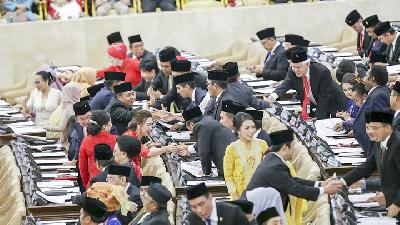
THE House of Representatives (DPR) has finished designating leaders of its agencies for the period of 2019-2024. The decision on the leadership distribution was made at a plenary meeting of the DPR on Tuesday, October 22.
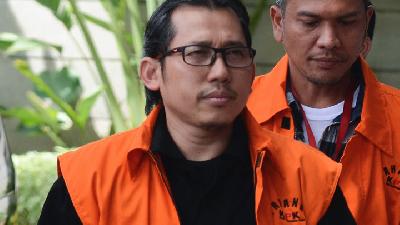
Yaya Purnomo, a former head of Regional Housing and Residential Finance Development Section at the Ministry of Finance’s Directorate General for Financial Proportionality, admitted to selling insider budgeting information to regional governments.

FROM predawn until daytime on May 22, the Petamburan area in West Jakarta looked like a battlefield.

AROUND half a century ago, a series of silat (martial arts) stories was published in Yogya, set in 16th century Java and titled Nagasasra dan Sabukinten. The stories, written by S.H. Mintardja, stopped after about 30 titles. Each title sold out. The readership was wide.
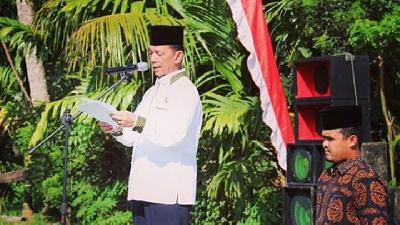
The development of the Batang Toru hydro power plant in South Tapanuli, North Sumatra, is partly due to the Pasaribu family. Permit processing went smoothly thanks to the Pasaribu brothers.

The performance of Melati Suryodarmo, Tony Broer and Anwari at the Borobudur Writers and Cultural Festival 2018 was full of life.

What’s your business to ask that?

*What, DPR building..! What are we doing here? **To become DPR members!
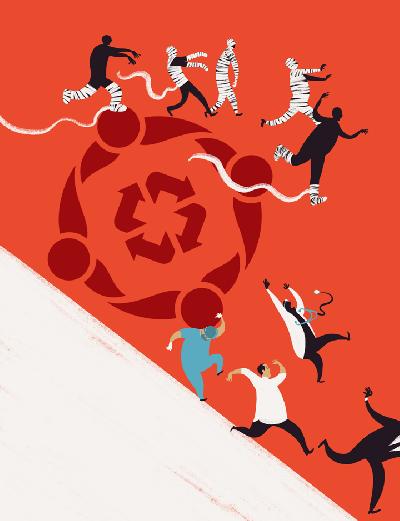
The government had gone back and forth to disburse reserved funds to patch up BPJS Health’s deficit. The gap between spending and revenues remain wide.

The Jakarta Ombudsman indeed has the authority to make recommendations on the Jakarta provincial government's policies

Lebanon acknowledges Indonesia’s contribution to maintaining world peace, particularly by placing its Garuda Contingent in the United Nations Interim Force in Lebanon (UNIFIL).

The Afghanistan High Peace Council expects Indonesia’s contribution to establishing peace in their country.

The issuing of Government Regulation in Lieu of Law (Perpu) No. 2/2017 on Mass Organizations has dangerous implications. People's civil rights are under threat. This Perpu could trigger a wave of harassment and persecution of members of banned organizations. The indications of these are already apparent. The move by several ministers and regional heads to sanction lecturers and civil servants who have joined the Hizbut Tahrir Indonesia (HTI) is an example.

The government is seeking to dissolve Hizbut Tahrir Indonesia because its ideology runs counter to Pancasila. Police have evidence that this hardline group plans to use the military to establish an Islamic state in 2018.

It is fascinating to see how different languages handle profanity and abuse-where their sensitive spots are, so to speak. Some languages focus on religion and blasphemy. Some target ethnicity and appearance. Others curse with animal names, or parts of the body. Many languages, English included, have developed a rich vocabulary of abuse around sexual intercourse, genitalia, and excretion.
In times past, cursing in English was more religion-based than it is today. 'God's Blood' used to be an extreme profanity. Abuse words relating to sickness and disease, like 'poxy' or 'scurvy' were also much more common when disease itself was a curse. "A plague on both their houses," Mercutio famously says in Romeo and Juliet. Shakespeare's plays are absolutely full of rich, inventive insults, but one word you will not find is today's most prevalent swear-word in English-the 'f' word. This is not because it was too offensive-but on the contrary, because in those days it was not. It was then a relatively recent addition to English meaning 'to copulate'. Today, 'f-k' is certainly not a word to be used in polite conversation, and is still coyly avoided in print (hence the hyphens). Yet it is one of the most colorful and versatile words in the English language, appearing in expressive combinations with various adverbs (off; about; around; up; with) and in various parts of speech (as noun, verb, adjective).

Minister of Research, Technology and Higher Education Muhammad Nasir said it is possible there are people claiming to have a close connection with him and acting as 'brokers' in elections at several universities. The former rector of Semarang's Diponegoro University said if this is indeed happening, he does not know about it nor would he be able to prevent them from 'trading influences' with rector candidates. "That's normal, but I wish it did not happen," he told Tempo during an interview in his study on Thursday, two weeks ago.
The minister's vote, which accounts for 35 percent, is a decisive factor in elections.
Because state universities are funded by the state budget, a minister is entitled to select one of three candidates. We don't just appoint people. Their track records are important, and they must have a clear vision and mission.

In June this year, BHP Billiton Indonesia made a surprising business decision by selling 75 percent of the shares of its subsidiaryIndoMet Coal (IMC)to Adaro Energy for US$120 million (Rp1.56 trillion). The acquisition gives Adaro, which already owns 25 percent stake in IMC, full control of the company.
The acquisition also marks BHP Billiton's exit from Indonesia's coal business, a field the company has been in since 1997. However, BHP Billiton Indonesia CEO Imelda Adhisaputra said their business decision should not be construed as a downscaling of the coal business. She contends that the coal sector will remain attractive if the government and business players are willing to adjust to conditions, adapt and improve.

HASAN Nasbi uttered some threatening words when Tempo met him at his office in South Jakarta last Tuesday. The Cyrus Network CEO said he was uncomfortable being interviewed about the funds allegedly contributed by the land reclamation developers to the Friends of Ahok organization, reportedly channeled through his political consultancy agency. "It would be nice if you wrote that," he said, "so I can sue you after."
Hasan denied Indonesian Democratic Party of Struggle (PDI-P) politician Junimart Girsang's statement that he had received Rp30 billion. He did not react when Tempo told them that the information had reached the Corruption Eradication Commission (KPK), after one of his subordinates testified on April 15. Tempo reporters Anton Aprianto, Wayan Agus Purnomo and Prihandoko recently spoke to Hasan.

The flight from Sumbawa disgorged a planeload of small businessmen, missionary families with young children, a few white-veiled nuns, a smattering of French and Dutch tourists, two Australian surfers and myself onto the tarmac of West Sumba's Tambolaka airport. We rode through a dry countryside of steepled churches atop hills, fields of galloping horses, clusters of stone slab graves, roofs of riotous bougainvillea blossoms, and rows of scraggly shops and squealing pigs being loaded into pickup trucks. In the late 1990s, I remember seeing loin-clothed wild pig hunters carrying spears along the road with their dogs, but not this time.
The landscape is still raw and relatively unpeopled-no factories, no billboards, no supermarkets-just gardens and country farmers markets. Sumba's famous top-hat alang-alang (thatch)-roofed traditional wooden dwellings are relentlessly being phased out and replaced by cinder-block buildings that cost considerably less to build. Like the rumah adat (traditional house), horses as transport are also being replaced by a dramatic proliferation of Japanese motorbikes. Cables creeping out from under grass roofs lead to meter-wide satellite dishes. People's calm reaction and behavior indicate that they are getting used to tourists.

KPH Salahuddin Setiawan Djodi Nur Hadiningrat-or simply Setiawan Djody-is a name frequently mentioned among those involved in a mega refinery construction project in Tuban, East Java. Djody, chairman of the Russia-Indonesia Friendship Society successfully brought Russian oil company Rosneft to build a refinery estimated to cost between US$13-14 billion. "In this Jokowi era, I want to be back in business," the tycoon told Tempo reporter Agus Supriyanto in a telephone interview followed by questions answered via the Internet while Setiawan was in Guangzhou, China, last week. The Surakarta-born businessman said he was enthusiastic about doing business, after a 10-year hiatus.

Touring the world's capitals, President Joko Widodo clearly has little taste for the sort of diplomacy enjoyed by predecessor Susilo Bambang Yudhoyono in his single-minded pursuit of foreign investment.
Extolling the virtues of doing business in Indonesia, Widodo wants capital for urgently needed infrastructure development and to reenergize the manufacturing sector as the new driver of a revived Indonesian economy.

Public service is something new to 52-year-old Amzulian Rifai, the new chairman of the Office of the Ombudsman. After all, he spent the past 25 years in the academic affairs of Sriwijaya University in Palembang, South Sumatra. But he is ready to dedicate himself to a new assignment, which is to be the people's 'ear', to listen to those disappointed by the quality of public services rendered. Amzulian believes the Ombudsman is the right place to dedicate his time and his resources. He decided to apply for the job, and in an open session, was elected chairman for the 2016-2021 period.
Amzulian is aware that leading the Office of the Ombudsman will not be an easy task. Right from the start, he has had to face the snide comments that the Ombudsman is nothing more than a toothless institution with no specific objective in mind. The building alone, he observed when he first went there, looked no better than a warehouse. "It was in really bad condition," he said in an interview last week.

THE 10 Indonesians kidnapped by the Abu Sayyaf terrorist group have yet to be released nearly a month since their capture. As of last Friday, the hostages were still hidden in the southern Philippines, with the armed group demanding a 50 million peso ransom, about Rp15 billion. Cabinet Secretary Pramono Agung said the government had decided to negotiate for their releasea resolution through 'soft diplomacy', as he put it.
The 10 hostages were taken from the Brahma 12 tugboat and the Anand 12 barge, on which all worked as crew members. They were intercepted in Tambulian waters near Tapul Island, an area close to the Indonesian-Filipino border and near Malaysian territorial waters.

HASBULLAH Thabrany thinks that the government does not show sufficient commitment to provide good health care services for the people, particularly populations living in remote areas. "But we have sufficient data to know what people in any given area need the most, so in fact the government should be able to provide it," he said.
On the very top of the list, obviously, is the need for the presence of doctors and nurses. This is why Hasbullah has full appreciation for the Pencerah Nusantara (Nation's Torchbearers) program that periodically sends out health care providers to remote villages around Indonesia.

Piracy is a crime that must not be tolerated. And rescuing the crew of the Anand 12 held hostage by Abu Sayyaf militants is now a priority of the government. But this must be done without negotiating with the kidnappers. Once we give in to their demands, they will carry out more terror acts. As soon as the authorities obtain the green light from the Philippine government, security officials should promptly carry out their rescue operation.
Early this week, Abu Sayyaf, an Islamic extremist group in the Philippines, hijacked Indonesian-flagged tugboat Brahma 12 and its barge, the Anand 12, that were carrying 7,000 tons of coal from the Puting river in South Kalimantan to Batangas in the southern Philippines. The pirates later released the Brahma 12, but detained the Anand 12 along with 10 sailorsall Indonesians and the cargo.

The rupiah continues to perform better than expected, hovering steady just below Rp14,000 per US dollar. The rupiah and US dollar interest rate movements, which a month ago moved in opposite directions, has yet to adversely impact the rupiah. In fact, there is enough confidence that if inflation, at its current 4.1 percent level, can be maintained, it could lead to the possibility of a second 25 basis point cut in Bank Indonesia's benchmark interest rate.
But the stock market's Jakarta Composite Index (JCI) is underperforming, dropping to 4,500 for the last six months. The bond market, though, is doing better, attracting both local and foreign investors. The question is how sustainable is this trend? Some are pointing to the negative interest rates in Japan and the low yields of other global currencies. The argument is that the resulting interest differential, between these currencies and the rupiah, is wide enough to cover the rupiah exchange rate volatility. This is why maintaining a stable rupiah becomes critical.

The conflict inside the Golkar Party appears to be reaching its final stages. The party, which for some time has been polarized by two factions, finally seems to be heading towards a reconciliation. The national leadership meeting (rapimnas) held at the end of January agreed that an extraordinary national convention should be held to elect new leaders. The convention is expected to end the dispute between Agung Laksono, elected chairman according to the Ancol national convention, and Aburizal Bakrie, elected by the Bali national convention.
An important development prior to the upcoming convention is the law and human rights ministry's extension up to June of the Golkar leadership as approved by the Riau national convention in 2009. This specific organizational structure lists Aburizal Bakrie as party chairman, Agung Laksono as the deputy and Idrus Marham as the secretary-general. "I'm happy with (results of) the national leadership meeting, because the government acknowledges the Golkar leadership, as approved by the Riau national convention, to be the legal one and extended its validity," said Aburizal.

Seven rocks the size of an adult head moved and swung in all directions, drunkenly. The actors deftly dodged left and right to avoid the swaying stones that always remained only several inches away from them. If anyone had been off-guard or slow to react they would have their heads seriously injured.
Merah Bolong Hitam Doblong ('Hollow Red Torn Black') has been staged many times by the Payung Hitam theater group, yet it has managed to continue to be a gripping work of art. This was even the case last August at the Teater Luwes, when director Rachman Sabur added several variations to create an even more gripping element of terror.

THE International Peoples' Tribunal, held in Nieuwe Kerk, the Netherlands, two weeks ago to address human rights violations committed in Indonesia during the violent events of 1965-1966 might have been nonbinding. It did, however, help bring some of the atrocities committed 50 years ago out of the shadows and into the light.
Several witnesses told stories of being tortured for supposed links to the Indonesian Communist Party (PKI). Some said the abuses were even ordered by members of the armed forces.

Although growth is still predicted at around 4.8 percent, the plunging value of the rupiah has battered Indonesia's economy in 2015. Hence the spotlight on Bank Indonesia, the central bank, and its efforts to safeguard monetary policy. The problem is that the Federal Reserve's decision to postpone deciding on the interest rates to next year is simply feeding more speculation. With the Chinese economy continuing to slow down, the situation is still far from comfortable for the Indonesian economy. "External conditions will still contribute to the stability of the financial markets and the stability of the financial system," Bank Indonesia Governor Agus Martowardojo told Tempo reporters Tomi Aryanto, Yandhrie Arvian, Ayu Prima Sandi and Andi Ibnu in an interview at the end of October.

In the 30 years of working with people living in Indonesia's coastal areas, Riyanto Basuki has discovered that people whose livelihood depended on the sea, tend to be twice as poor as people living off the land. "Their homes are nothing more than huts, even though their income from fishing is not too bad," said Riyanto, 55, director of marine services at the marine and fisheries ministry.
Before he got the job last August, Riyanto was director of coastal communities and business development. And long before that, he was a researcher at the marine fisheries research office, part of the agriculture research and development agency. As a graduate in fisheries and marine science from the Bogor Institute of Agriculture (IPB), his current work includes managing coastal environment and empowering people living in coastal areas.

THE hearing opened at Palembang District Court last Tuesday as the city outside sat blanketed in haze. "Visibility is less than 200 meters," commented Hadi Jatmiko, Indonesian Environmental Forum's Director for South Sumatra, who attended the trial.
Palembang District Court was in session hearing a civil lawsuit brought by the environment and forestry ministry against Bumi Mekar Hijau. The ministry is demanding the company pay Rp7.9 trillion back to the state for the illegal clearing of 20,000 hectares of land on the company's concession.

Danang Girindrawardana should not have hesitated in supporting the majority decision of the Indonesian Ombudsman, the institution he chairs. An investigation by this organization concluded that the police wrongfully managed the case involving Corruption Eradication Commission (KPK) investigator, Novel Baswedan.
Instead of approving, signing and sending the collective decision to the police, Danang did nothing. His reasoning that the Ombudsman should not be influencing a case currently under police investigation makes no sense at all. By not processing such an important evidence, he is undermining the very institution he leads.

Despite two plenary sessions, the Indonesia Ombudsman failed to issue a recommendation concerning Novel Baswedan's complaint. Novel Baswedan, a Corruption Eradication Commission (KPK) investigator, filed a complaint with the Indonesian Ombudsman concerning the alleged administrative violation by police who arrested and detained him.
Budi Santoso, member of the Ombudsman board, said a draft recommendation was ready to be signed by the Ombudsman chairman, Danang Girindrawardana. "But there were dissenting views among the leaders," he said Thursday last week. Budi said the eight-member team had produced a draft recommendation raised in the Ombudsman executive plenary sessions on August 11 and 31, but it was not agreed upon.

As protests rejecting the Uber car hire company grew louder, Karun Arya found himself coming more frequently to Jakarta. Last month, this spokesman for Uber Southeast Asia and India was in Jakarta twice in a month. Now, he must be in Jakarta every week to attend meetings.
But Arya is used to facing rejection and protets, as he has in places like India and the Philippines and he is optimistic he will overcome these challenges in Jakarta. "I would like to come here for sightseeing, not to deal with problems," said Arya, when he was interviewed by Tempo reporter Syailendra Persada in Jakarta, last week.

On September 28, Tri Rismaharini must give up her job as mayor of Surabaya city to an acting mayor appointed by the East Java Governor Soekarwo. That will be the end of her term.
Her bid re-election did not go smoothly. It was not because she failed to lead and develop Surabaya. In fact she did them so well that she became very popular, scaring away other challengers. So far she and Whisnu Sakti Buana are the sole contenders.

A message forwarded on WhatsApp appeared on Alfatih Timur's cellphone, two weeks ago. It was an appeal from the Indonesian Red Crescent to help the victims of the recent rioting at Papua's Karubaga district of Tolikara regency.
Alfatih, the 24-year-old manager of kitabisa.coma social fundraising websitewas moved, and shared it with another website manager, Vikra Ijaz. After some discussion, the two agreed to get help for Tolikara. "We must do fundraising," he said last week. They agreed that funds were needed to rebuild the mosque which burned down in the rioting.

ABU Tahay does not spend much of his time in his village of Bhuthidaung, in Rakhine State. This Rohingya community leader and founder of the United National Development Party only goes back to campaign before elections. "And even then I'm tightly guarded by security forces," whose other name is Tha Aye, told Tempo reporter Purwani Diyah Prabandari at his party headquarters, at a shop-house complex in Yangon, Myanmar, last week. He can actually go back anytime to Rakhine, but it's a big hassle. "We must fill out forms," he said, even though he is a resident of Yangon, and not of Rakhine.

ON Thursday, March 5, the rupiah exchange rate plunged to its lowest since 1998. At that time, the rupiah closed at Rp13,022 to the US dollar. Until last week, the rupiah remained stable around that rate. But this has not made the central bank (Bank Indonesia) governor, Agus Martowardojo go into a panic. He urged the public not to worry. "I feel good because the Indonesian economy is in good shape," Agus told Tempo, in an interview last week.
Agus has given assurances that the rupiah's weakening is only temporary, because the exchange volatility against the US dollar is still being monitored very carefully. He said that Bank Indonesia would always remain in the market for the sake of the rupiah's volatility. "Wait for its peak in July, when the government will focus on strengthening current transactions," said Agus. To strengthen the rupiah, Bank Indonesia will also take steps with regards to monetary policy.

FOR over a week, security guards at the KPK building had detected the lurking presence of 'strangers' in their vicinity. They had been on high alert ever since the KPK indicted Police Comr. Gen. Budi Gunawan for bribery and illegal gratification, two weeks ago.
If previous experience is anything to go by, legal proceedings against senior police officers tend to trigger a counterattack against the KPK. This happened in 2009 and 2012. The guards concluded that the 'strangers' were plain-clothes police officers, because they recognized one of them: John Charles Nababan, who was once a KPK investigator and who is now assigned at the internal security section of the Profession and Security Division of National Police Headquarters.

Police Comr. Gen. Budi Gunawan's bank account has seen its fair share of financial activity. According to the records of the anti-money laundering Financial Transactions Reporting and Analysis Center (PPATK), which checked him out in 2008, at least two bank accounts of Budi and his son received Rp111.5 billion since 2004. The funds came from police officers and companies with no clear connection.

The process of nominating Comr. Gen. Budi Gunawan for the position of police chief can be said to be a lightning job. He was named as the replacement of Gen. Sutarman, who was scheduled to retire in nine months' time. But Budi's career is marred by an old case being investigated by the Corruption Eradication Commission (KPK): suspicious transactions between 2004 and 2008.
Four days after President Joko Widodo submitted his name to the House of Representatives (DPR), the KPK indicted Budi for bribery and accepting illegal gratuities. But instead of delaying its fit-and-proper test, the DPR accelerated the process, approving his nomination in less than a week, a record time. In 2013, it took Sutarman 20 days to get the legislature's approval.

TO Dyah Kartika Rini Djoemadi, coordinator of Jokowi's Advanced Social Media Volunteers (Jasmev), the 2014 presidential election was a chance to prove themselves. Determined to totally focus on the task ahead, Kartika took a three-month leave from Spindoctors Indonesia, the political strategy and public policy consulting firm she founded, to devote all of her time to Jasmev. Not surprisingly, until the actual election day on July 9, DeeDeeas Kartika is better knowncould be found in the Jasmev war room in a building at Gondangdia, Central Jakarta.
There DeeDee, 34, coordinated the activities of 150 volunteers, who worked in three shifts. Each of them employed a laptop in their operations to ensure Joko Widodo was elected president. "I had to monitor the war room every day. Doing it part-time would not have been effective," she told Tempo in Jakarta two weeks ago.

REDD+ has fallen well short of expectations, but there is still hope.
So asserts a new REDD+ case book, published by the Center for International Forestry Research (CIFOR) two weeks ago to coincide with the United Nations climate change negotiations in Peru.
REDD, or reducing emissions from deforestation and forest degradation, is a climate change mitigation mechanism that would pay developing countries like Indonesia to save their forests instead of cutting them down. REDD+ is the broadened version of the concept that includes other conservation activities.

IN a small and cozy dining room of a house at the Widya Chandra ministers' residential complex in South Jakarta, Bambang Brodjonegoro dispelled the stereotype of a finance minister: cold, terse and super-cautious, when talking to members of the media. At a dinner with national media chief editors, Bambang spoke in a relaxed manner about his new position. "The Finance Ministry must actively push for a maritime vision and tariff harmonization," he said.
Bambang spiced his talk with anecdotes of football, a game he is a fan of. "I want the ministry not just to be a stopper, it must also be a libero (a soccer term for the sweeper position)," he said, to the laughter of everyone present. Bambang's analogy of his responsibilities should be taken seriously. He seems to genuinely want his ministry to go beyond oversight duties. He is determined to push his bureaucrats to be more active, productive and strive for breakthroughs, not business as usual. This includes smoother relations with bureaucrats from the other ministries.

UNDER the public spotlight for implementing a crucial corporate act at the end of President Susilo Bambang Yudhoyono's term, the chief executive of Telekomunikasi Indonesia claimed to be unconcerned. The share-swap option between the companies, Dayamitra Telekomunikasi (Mitratel) and Tower Bersama Infrastructure (TBIG) nevertheless proceeded, although a member of its board of commissioners disapproved of the move.
Intra Utoyo, acting CEO of Telkom insisted no politics were involved in the transaction. In an interview with Tempo reporters Akbar Tri Kurniawan and Gustidha Budiartie last week he clarified the motives behind the share-swap transaction. Excerpts:

Titled The Roving Eye, the show was curated by Iola Lenzi, the accomplished researcher and critic of Southeast Asian art. It encompasses works by 36 leading artists from Cambodia, Indonesia, Malaysia, Myanmar, Philippines, Singapore, Thailand and Vietnam, including established and emerging artists.
The show brings to Turkey issues and situations in the Southeast Asian region which may share similarities but which have been expressed in its own characteristic ways. Many of the works are interactive and participatory, rendering the viewer a special personal. In general, it can be said that this first display of Southeast Asian works in Turkey fully matches the high standards set by Arter, both in terms of content, excellence and quality.

Abu Tahay, the founder of the National Democratic Party for Development, has never stopped fighting for the recognition of the Rohingyas as citizens of Myanmar. He travels around the world to gather support so that they will no longer be considered illegal immigrants. He keeps old historical documents that prove the Rohingyas are legitimately part of Myanmar.
"The Rohingya people have been there before the 18thcentury. This is based on the document published in 1799 which confirms the Rohingyas were there," said Tahay, showing the documents during his recent visit to the Tempo office two weeks ago.

The deadline for the ASEAN Economic Community (AEC) is looming. In just a few months, there will be a freer flow of labor, services, investment and goods between the ten Association of Southeast Asian Nations (ASEAN) member states. But so far, there have been few serious discussions on how this policy of regional economic integration will impact on the people.
To address this concern, the International Labor Organisation (ILO) and the Asian Development Bank (ADB) launched a report titled ASEAN Community 2015: Managing Integration for Better Jobs and Shared Prosperity in Jakarta two weeks ago, which highlights the demographic and employment trends in ASEAN.

The old photo of Borobudur shows a slightly different temple than the one that stands today. Atop the structure's highest stupa is a three-tiered, stone umbrella called a chattra. Today at the temple, located in Yogyakarta, there is no such parasol. French photographer Jean Demmeni took the photo, most likely between 1907 and 1911 when Borobudur was being restored by Theodore van Erp, an engineer from the Dutch army.
It is a rare photo of Borobudur. Demmeni rarely shot temples, and there are only a few such shots in the 150 of his photos that were recently on display at Rumah Topeng (Mask House) in Ubud, Bali. Among them is a Balinese pura temple in Singaraja, the Mendut temple in Central Java and Borobudur. Demmeni's relative unfamiliarity with temples shows in the notes he took about them. He jotted down that Mendut and Borobudur are Hindu temples, though both were built by Buddhists.

ACCORDING to the invitation, which was widely distributed, the event being held on the grounds of the Padepokan Pencak Silat building at the Beautiful Indonesia in Miniature (TMII) theme park in Jakarta, on Thursday afternoon last week, should have been attended by 50,000 volunteers for presidential candidate Prabowo Subianto and his running mate Hatta Rajasa. But the gathering, dubbed a 'peaceful rally', was attended by only a few hundred of the volunteers.
Prabowo and Hatta, who were initially scheduled to attend, also did not appear. Lt. Gen. (ret.) Yunus Yosfiah, a member of the campaign team, apologized for Prabowo's absence. "Prabowo is very busy," Yunus, a former minister of information, told the crowd.

Student protests occurred in many cities during the early 1970s. From Bandung and Jakarta the demonstrations spread to Medan, Padang, Surabaya and Ujung Pandang. They proclaimed their opposition to foreign capital, the construction of the Taman Mini Indonesia megabucks park project, the Marriage Bill and corruption. The protests reached a climax in the capital on January 15, 1974.

The use of piped natural gas is cheaper than LPG. However, its distribution is still limited because of natural gas supply shortages.

On the eastern part of Sumba Island, Mbatakapidu village chief Jacob Tanda is synonymous with bountiful harvests. He succeeded in turning around a perennial food shortage into abundance and resilience, thanks to his innovative farming ways. He urged his villagers to plant 10 kinds of crops and to re-use the traditional barns to store food. He persuaded women active in the local Community Welfare Program (PKK), to carry out a 'love your local products' campaign. In just four years, he altered an impoverished village into a bountiful, resilient community. Tempo reporter Syari Fani flew to eastern Sumba to report on this success story on the occasion of World Food Day on October 16.

The fate of Trubus Sudarsono, one of former president Sukarno's favorite artists, remains unknown. Born in Wates, Yogyakarta, on April 24, 1924, Trubus was known in the 1960s as a talented painter and a figure in the Lekra cultural organization. Trubus also got involved in politics as a member of the Yogyakarta Regional Legislative Council (DPRD), representing the Indonesian Communist Party (PKI).
Trubus, whose first job was preparing food for carriage-pulling horses, traveled abroad often in his later life. He lived in Praha, Czechoslovakia, for one month. While in Eastern Europe, he visited museums, ceramics factories, places where stone and bronze statues were made and art training centers. He also studied how the state subsidized art activities.
After the political upheaval of 1965, the year General Suharto seized power from Sukarno, it was said Trubus had been caught by the military while in hiding on the slopes of Mount Merapi. He had been carrying a Behring radio to monitor the situation. It's not known what happened to him after that. Was he executed, shot and killed? Perhaps he was imprisoned first? But where? Or did he he go free, and choose not to return to public life? His family continues to search for him. His children believe he is still alive. This is Tempo's report.

Nearly all of Trubus' paintings are of women.

The boss of Microsoft and businessman Tahir signed a US$200-million cooperation plan to fight contagious diseases.
Independent journalism needs public support. By subscribing to Tempo, you will contribute to our ongoing efforts to produce accurate, in-depth and reliable information. We believe that you and everyone else can make all the right decisions if you receive correct and complete information. For this reason, since its establishment on March 6, 1971, Tempo has been and will always be committed to hard-hitting investigative journalism. For the public and the Republic.